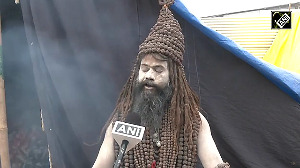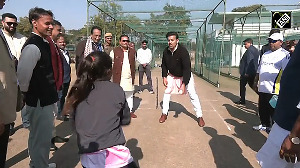The government has taken the first concrete step towards the introduction of the goods and services tax.
Since the introduction of the tax would require amendment to the Constitution, the government has sought the Supreme Court's opinion on the amendments proposed. This will ensure these amendments are not challenged in the court later.
This has been done through a presidential reference to the Supreme Court.
Since the process may take a few months, the government is running the risk of missing the GST rollout deadline for the second time.
"We have prepared the questions and sent the draft for Constitutional amendment to the law ministry. It suggested seeking the Supreme Court's advice through a presidential reference, so that all possibilities of litigation are eliminated after the Bill is enacted," said a senior finance ministry official.
In the Presidential reference made to Justice S H Kapadia of the apex court, the law ministry identified four key options before the government. Two of these are known to involve amending the Constitution: one would put GST on the Concurrent List and the other would enact a new provision for states to enter into an agreement with the Union government with regard to levy and collection of a Central tax within the state.
"There is no harm in taking the Supreme Court's advice, but the Centre should have done more research internally. The process may take six months to one year," said Satya Poddar, partner, Ernst & Young.
The key question is whether the amendments will alter the basic structure of the constitution.
"The Union government is deliberating whether the changes will tinker with the fundamental structure of the Constitution, which could be questioned in the court," said another finance ministry official.
If the government decides to put GST in the Concurrent List, where the power vests with the states as well as the Union, views of Parliament will prevail over the states in case of a dispute as per the structure of the Constitution. This has got the states worried, as they fear losing power to the Centre.
Another option is the 13th Finance Commission's recommendation of a Constitutional provision to facilitate a tax agreement between the Centre and the states on the lines of the erstwhile Article 278. The Centre may have problems in re-enacting Article 278 because dealing with princely states was temporary, but GST would be a permanent tax.
"Presidential reference is required because it is Constitutional amendment and even Parliament is not allowed to disrupt the basic structure. The court will decide whether it is breach of fundamental right when a right is shifted from the states to the Centre," said Madhya Pradesh finance minister Raghavji.
The minister said more than 50 per cent states would have to agree for a proposal to be part of the GST, but leaving even a single state unsatisfied on a particular point could result in the exercise being challenged in the court.
States' consent would not be there unless all matters were resolved, he said, and agreed the process of taking presidential reference might take a few months.
Under Article 143 of the Constitution, if it appears to the president that a question of law or fact has arisen, or is likely to arise, which is of such a nature and public importance that it is expedient to obtain the opinion of the Supreme Court upon it, he/she may refer the question to the court for its consideration. The court, after such hearing as it thinks fit, will give its opinion to the president.
A presidential reference to the Supreme Court on centre-state law making power was also made in the case of Gujarat Gas (Regulation of Transmission, Supply and Distribution) Act in 2001 after which the Centre's right to legislate on natural gas was upheld while the court struck down the validity of the Gujarat government's bid to legislate on the matter.








 © 2025 Rediff.com -
© 2025 Rediff.com -